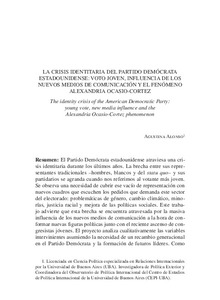Por favor, use este identificador para citar o enlazar este ítem:
https://repositorio.uca.edu.ar/handle/123456789/18531| Campo DC | Valor | Lengua/Idioma |
|---|---|---|
| dc.contributor.author | Alonso, Agustina | es |
| dc.coverage.spatial | Estados Unidos | es |
| dc.coverage.temporal | SIGLO XXI | es |
| dc.date.accessioned | 2024-08-09T12:12:08Z | - |
| dc.date.available | 2024-08-09T12:12:08Z | - |
| dc.date.issued | 2022 | - |
| dc.identifier.isbn | 987-978-620-552-8 | - |
| dc.identifier.uri | https://repositorio.uca.edu.ar/handle/123456789/18531 | - |
| dc.description.abstract | El Partido Demócrata estadounidense atraviesa una crisis identitaria durante los últimos años. La brecha entre sus representantes tradicionales –hombres, blancos y del statu quo– y sus partidarios se agranda cuando nos referimos al votante más joven. Se observa una necesidad de cubrir ese vacío de representación con nuevos cuadros que escuchen los pedidos que demanda este sector del electorado: problemáticas de género, cambio climático, minorías, justicia racial y mejora de las políticas sociales. Este trabajo advierte que esta brecha se encuentra atravesada por la masiva influencia de los nuevos medios de comunicación a la hora de conformar nuevas figuras políticas junto con el reciente ascenso de congresistas jóvenes. El proyecto analiza cualitativamente las variables intervinientes asumiendo la necesidad de un recambio generacional en el Partido Demócrata y la formación de futuros líderes. Como estudio de caso, la presente investigación analiza a la joven congresista Alexandria Ocasio-Cortez, quien muestra una destacada aceptación entre el votante joven debido a su origen de clase media, sus propuestas progresistas y su visibilidad en las redes sociales. | es |
| dc.description.abstract | The American Democratic Party has been suffering an identity crisis for the last few years. The gap between their traditional representatives –men, white and status quo– and their supporters increases when we consider the younger voter. It is necessary to fill this gap in representation with new leaders who listen to the demands of this constituency: gender issues, climate change, minorities, racial injustice and social policies. This work warns that this gap is crossed by the massive influence of the new media in shaping new political figures along with the recent rise of young congress people. This project analyzes qualitatively the variables involved assuming the need for a generational change in the Democratic Party and the formation of future leaders. As a study case, the current research analyzes the young congresswoman Alexandria Ocasio-Cortez who shows an outstanding acceptance among young voters due to her working-class origin, her progressive legislative agenda and her visibility in social media. | es |
| dc.format | application/pdf | es |
| dc.language.iso | spa | es |
| dc.publisher | EDUCA | es |
| dc.rights | Atribución-NoComercial-CompartirIgual 4.0 Internacional | * |
| dc.rights.uri | http://creativecommons.org/licenses/by-nc-sa/4.0/ | * |
| dc.subject | Estados Unidos | es |
| dc.subject | PARTIDOS POLITICOS | es |
| dc.subject | VOTO | es |
| dc.subject | SISTEMAS ELECTORALES | es |
| dc.subject | MEDIOS DE COMUNICACION | es |
| dc.title | La crisis identitaria del partido demócrata estadounidense. Voto joven, influencia de los nuevos medios de comunicación y el fenómeno Alexandria Ocasio Cortez | es |
| dc.title | The identity crisis of the american democratic party. Young vote, new media influence and the Alexandria Ocasio Cortez phenomenon | es |
| dc.type | Parte de libro | es |
| uca.disciplina | CIENCIA POLITICA | es |
| uca.issnrd | 1 | es |
| uca.affiliation | Fil: Alonso, Agustina. Universidad de Buenos Aires; Argentina | es |
| uca.version | publishedVersion | es |
| item.fulltext | With Fulltext | - |
| item.languageiso639-1 | es | - |
| item.grantfulltext | open | - |
| Aparece en las colecciones: | Libros/partes de libro | |
Ficheros en este ítem:
| Fichero | Descripción | Tamaño | Formato | |
|---|---|---|---|---|
| CRISIS-IDENTITARIA-PARTIDO.pdf | 115,06 kB | Adobe PDF |  Visualizar/Abrir |
Este ítem está sujeto a una Licencia Creative Commons

